状语从句
状语从句(完整版)

While there is life there is hope. (while = __a_s_l_o_n_g_a_s_ )
状语时用来修饰 动 词, 形容 词, 副 词或 句子 的一种句子成分。它可以表示时间、地点、 原因、目的、结果、条件、让步、比较、方式等。 当充当状语的部分是一个句子时,也就是状语从
句。分类如下:
状语从句
1. 时间状语从句 2. 地点状语从句 3. 原因状语从句 4. 条件状语从句 5. 让步状语从句 6. 目的状语从句 7. 结果状语从句 8. 方式状语从句 9. 比较状语从句
I had no sooner begun to talk than he rang off. No sooner had I begun to talk than he rang off. 我还未来得及讲话,他就挂断了电话。
1. I was so familiar with him that I recognized his voice
考点:名词短语引导时间状语从句
• 1. When every time I was in trouble, he would come to help me.
• 2. At next time you come, do remember bring your son here.
• 3. For the first time I met the girl. I felt in love with her.
c.f. He might be ill, for he didn’t come to
(完整版)状语从句详解+例句
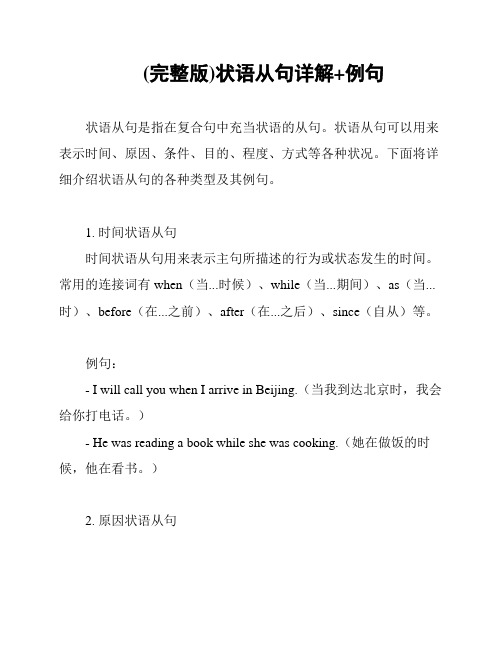
(完整版)状语从句详解+例句状语从句是指在复合句中充当状语的从句。
状语从句可以用来表示时间、原因、条件、目的、程度、方式等各种状况。
下面将详细介绍状语从句的各种类型及其例句。
1. 时间状语从句时间状语从句用来表示主句所描述的行为或状态发生的时间。
常用的连接词有when(当...时候)、while(当...期间)、as(当...时)、before(在...之前)、after(在...之后)、since(自从)等。
例句:- I will call you when I arrive in Beijing.(当我到达北京时,我会给你打电话。
)- He was reading a book while she was cooking.(她在做饭的时候,他在看书。
)2. 原因状语从句原因状语从句用来表示主句所描述的行为或状态的原因。
常用的连接词有because(因为)、since(因为)、as(由于)、for (因为)等。
例句:- I can't go to the party because I have to work.(我不能去参加派对,因为我得工作。
)- Since it is raining, we should stay at home.(由于下雨了,我们应该待在家里。
)3. 条件状语从句条件状语从句用来表示主句所描述的行为或状态的前提条件。
常用的连接词有if(如果)、unless(除非)、whether(无论)、provided(倘若)等。
例句:- If it rains tomorrow, we will stay indoors.(如果明天下雨,我们会呆在室内。
)- We can go shopping unless it is too late.(除非太晚,否则我们可以去购物。
)4. 目的状语从句目的状语从句用来表示主句所描述的行为或状态的目的。
常用的连接词有so that(以便)、in order that(为了)、lest(免得)等。
状语从句完整版
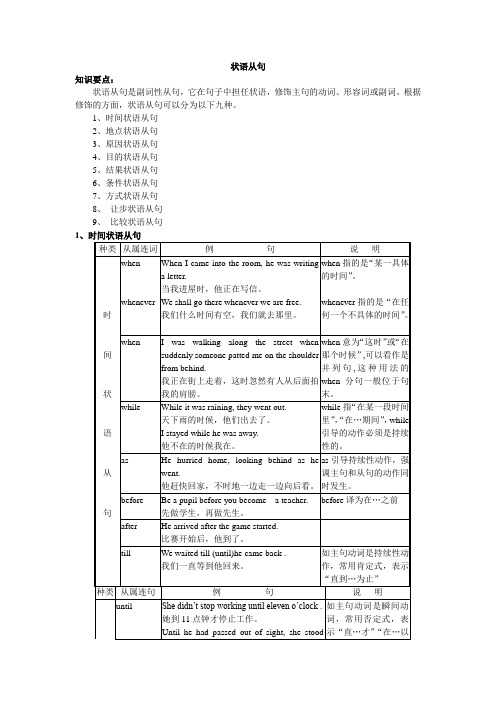
间
状
when
I was walking along the street when suddenly someone patted me on the shoulder from behind.
我正在街上走着,这时忽然有人从后面拍我的肩膀。
when意为“这时”或“在那个时候”,可以看作是并列句,这种用法的when分句一般位于句末。
万一我忘了,请提醒我一下。
So far as I know, the book will be published next month.
据我所知,那本书下月出版。
unless从句的谓语只能用肯定式。unless和if…not同义,unless是书面语,if…not是口语,通常二者可以换用。
条件状语从句中的谓语动词的时态一般要用现在时或过去时代替一般将来时或过去将来时。
他的行动就好象什么也没有发生。
They treat the black boy as if (though) he were an animal.
他们对待这黑孩子仿佛他是一头牲口。
此处as译为,按照或正如
as if或as though的意义和用法基本一样。从句中可以用现在时表示可能符合事实,也可以用虚拟语气。
It is so interesting a novel that all of us want to read it.
这是一本十分有意思的书,大家都想看。
such…that的such后面跟名词,如果名词是单数就要用such a /an…that还可以转换用so…that,语气较强
种类
从属连句
例句
说明
即使明天下雨,我也要去。
十大状语从句类型

十大状语从句类型
十大状语从句类型:
1. 时间状语从句
当我们谈到时间时,常常使用时间状语从句来表达具体的时间点或时间段。
例如:当我到达学校时,已经下午三点了。
2. 原因状语从句
我们常常使用原因状语从句来解释一个事件或行为的原因。
例如:我没去参加聚会,是因为我生病了。
3. 条件状语从句
条件状语从句常常用来表达一个条件对结果的影响。
例如:如果明天下雨,我们就不出去玩了。
4. 目的状语从句
目的状语从句用来说明一个行为或动作的目的。
例如:我学习英语,是为了能够和外国人交流。
5. 结果状语从句
结果状语从句用来说明某个行动或情况所导致的结果。
例如:她很努力学习,结果考试取得了好成绩。
6. 让步状语从句
让步状语从句用来表示一个与主句相反的情况或条件。
例如:尽管
下雨了,但他还是出去跑步了。
7. 比较状语从句
比较状语从句用来表示两个或多个事物之间的比较。
例如:他比我更高大。
8. 方式状语从句
方式状语从句用来说明某个行动或动作的方式。
例如:他悄悄地走进房间。
9. 地点状语从句
地点状语从句用来说明某个行动或动作发生的地点。
例如:我们在公园里见面。
10. 比较状语从句
比较状语从句用来表示两个或多个事物之间的比较。
例如:她比我更聪明。
这是十大常见的状语从句类型,通过使用不同类型的状语从句,我们可以更加准确地表达我们的意思,使语言更加丰富多样。
同时,了解这些状语从句的用法也能够帮助我们更好地理解和使用复杂句子。
状语从句

8.由as long as和so long as 引导的时间状语从句。这两个连词表示 “有多久……就多久”,通常译为“只 要”。 你可以随意到哪里去,只要在天黑以前回 来就行。 You can go where you like as long as you get back before dark. I will fight against these conditions as long as there is a breath in my body! 只要我一息尚存,我就要反对这种境况。
7.由each time, every time和whenever Each time he came to Harbin, he would call on me. 他每次来哈尔滨,总是来看我。 Whenever that man says“To tell the truth”, I suspect that he's about to tell a lie. 每当那个人说“说实在话”的时候,我猜想 他就要说谎了。 You grow younger every time I see you. 每次遇到你,见你更年轻了。
I worked until he came back. 我工作到他回来为止。 I didn't work until he came back. 他回来我这才开始工作。
4.由since引导的时间状语从句。 since引导的从句的谓语动词可以是延续性 的动词,又可以是瞬时动词。一般情况下, 从句谓语动词用一般过去时,而主句的谓 语动词用现在完成时。但在It is +时间+ since从句的句型中,主句多用一般现在时。 自从你离开以来,我一直在北京了。 I have been in Beijing since you left. 我妹妹不在北京住有四年了。 It is four years since my sister lived in Beijing.
八种状语从句

八种状语从句状语从句在句中作状语,修饰主句中的动词、形容词和副词等。
按其作用和意义可分为时间、原因、目的、结果、条件、让步、方式、比较八种。
下面对这八种从句的要点加以总结。
一、各类状语从句的引导词及易混词的区别。
1. 时间状语从句1) 引导词(1)表示“当……时候”:when, while, as, whenever(2)表示“一……就……”:as soon as(3)其它:after, before, since, until, by the timeWhenever he comes, he brings a friend. 他每次来都带个朋友。
I want to see him as soon as he arrives. 他一来我就要见他。
I went to bed after I finished my homework. 我做完家庭作业之后才睡觉。
2) 易混引导词when, while, as 的区别when既可指“时间点”,与瞬时动词连用,也可指“时间段”,与延续性动词连用(这时可与while互换)。
如:When he came in, his mother was cooking. 他进来时,他妈妈正在烧饭。
When(While)we were at school, we went to the library every day. 我们在校求学时,每天都到图书馆去。
while 只表示时间段,因此while从句的谓语动词要用延续性动词。
Please don' t talk so loud while others are talking. 别人在工作时,切勿大声讲话。
as 与when 用法相似,但着重强调主句动作与从句动作同时发生,有“随着……”或“一边……一边……”之意。
She sang as she went along. 她边走边唱。
As you get older, you get more knowledge.随着年龄的增长,你获得的知识就越多。
英语九大状语从句

英语九大状语从句:1.时间状语从句(Time adverbial clause):指定一个时间点或时间段。
例如:I will call you when I get home.(我回家后会给你打电话。
)2.地点状语从句(Place adverbial clause):指定一个地点或位置。
例如:She looked for her keys where she last saw them.(她在上次看到它们的地方找钥匙。
)3.原因状语从句(Reason adverbial clause):提供一个原因或解释。
例如:She didn't come to the party because she was feeling sick.(她因为感觉不舒服所以没有来参加派对。
)4.结果状语从句(Result adverbial clause):表达一个结果或效果。
例如:He studied hard, so he passed the exam.(他努力学习,所以考试通过了。
)5.条件状语从句(Conditional adverbial clause):表示一个条件。
例如:If it rains tomorrow, we will stay indoors.(如果明天下雨,我们会呆在室内。
)6.比较状语从句(Comparison adverbial clause):进行比较。
例如:He sings better than anyone else I know.(他唱得比我认识的任何人都好。
)7.目的状语从句(Purpose adverbial clause):表示一个目的或意图。
例如:I bought groceries so that I can cook dinner.(我买了杂货,这样我就能做晚饭了。
)8.方式状语从句(Manner adverbial clause):描述一个行为或方式。
例如:She speaks as if she knows everything.(她说话的样子好像她什么都知道。
状语从句用法详解
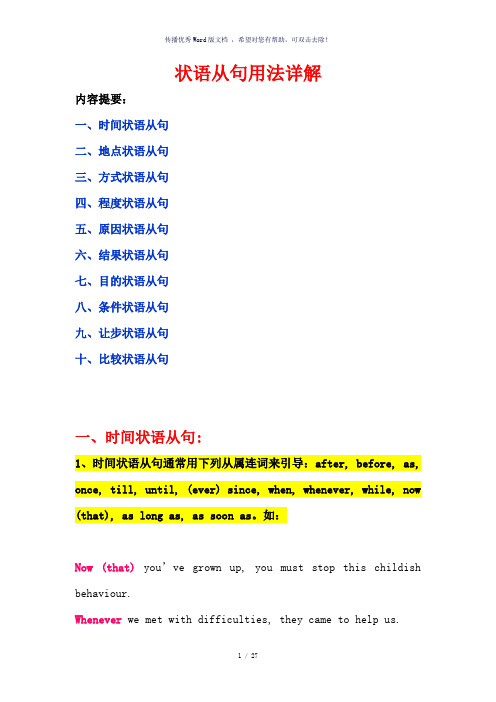
状语从句用法详解内容提要:一、时间状语从句二、地点状语从句三、方式状语从句四、程度状语从句五、原因状语从句六、结果状语从句七、目的状语从句八、条件状语从句九、让步状语从句十、比较状语从句一、时间状语从句:1、时间状语从句通常用下列从属连词来引导:after, before, as, once, till, until, (ever) since, when, whenever, while, now (that), as long as, as soon as。
如:Now (that)you’ve grown up, you must stop this childish behaviour.Whenever we met with difficulties, they came to help us.Come and see us whenever you have time.People do not know the value of health till they lose it.2、有些词,如 immediately, directly, instantly 等,当用于 as soon as 意义时,也可以引导时间状语从句,如:I got in touch with him immediately I received his letter. My sister came directly she got my message.The machine will start instantly you press the button.I’ll telephone you directly I hear the news.Will you look for it immediately you get there?3.某些表示时间的名词词组,如 the (very) moment ( = as soon as ), the minute ( = as soon as ), the instant ( = as soon as ), the day, the year, the morning, every time, each time, next time, the first time 等,也可以引导时间状语从句,如:I’ll tell you about it the moment you come.I started the instant I heard the report.The instant she saw him she knew he was her brother.Every time I catch a cold, I have pain in my back.I’m going to see him next time he comes to Shenzhen.He left Europe the year World WarⅡbroke out.He had impressed me that way the first time I met him.I started the very moment I got your letter.I’ll tell him the minute (that) he gets here.4.有些关联从属连词,如 no sooner … than / hardly … when / scarcely … when / barely …when 等,也能引导时间状语从句。
状语从句(完整归纳)
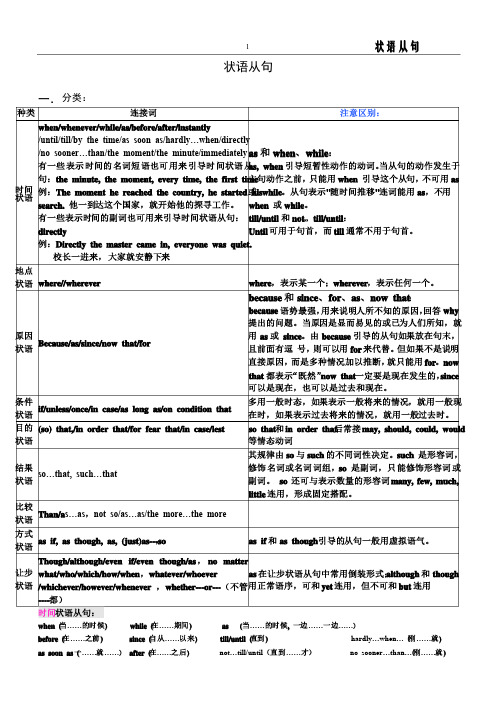
状语从句一.分类:种类连接词注意区别:时间状语when/whenever/while/as/before/after/instantly/until/till/by the time/as soon as/hardly…when/directly/no sooner…than/the moment/the minute/immediately有一些表示时间的名词短语也可用来引导时间状语从句:the minute, the moment, every time, the first time例:The moment he reached the country, he started hissearch. 他一到达这个国家,就开始他的探寻工作。
有一些表示时间的副词也可用来引导时间状语从句:directly例:Directly the master came in, everyone was quiet.校长一进来,大家就安静下来as和when、while:as, when 引导短暂性动作的动词。
当从句的动作发生于主句动作之前,只能用when 引导这个从句,不可用as或while。
从句表示"随时间推移"连词能用as,不用when 或while。
till/until和not…till/until:Until可用于句首,而till通常不用于句首。
地点状语where//wherever where,表示某一个;wherever,表示任何一个。
原因状语Because/as/since/now that/forbecause和since、for、as、now that:because语势最强,用来说明人所不知的原因,回答why提出的问题。
当原因是显而易见的或已为人们所知,就用as或since。
由because引导的从句如果放在句末,且前面有逗号,则可以用for来代替。
但如果不是说明直接原因,而是多种情况加以推断,就只能用for。
9大状语从句
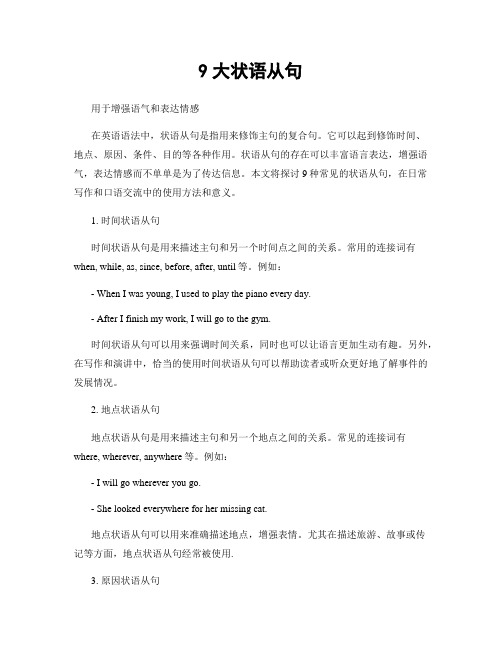
9大状语从句用于增强语气和表达情感在英语语法中,状语从句是指用来修饰主句的复合句。
它可以起到修饰时间、地点、原因、条件、目的等各种作用。
状语从句的存在可以丰富语言表达,增强语气,表达情感而不单单是为了传达信息。
本文将探讨9种常见的状语从句,在日常写作和口语交流中的使用方法和意义。
1. 时间状语从句时间状语从句是用来描述主句和另一个时间点之间的关系。
常用的连接词有when, while, as, since, before, after, until等。
例如:- When I was young, I used to play the piano every day.- After I finish my work, I will go to the gym.时间状语从句可以用来强调时间关系,同时也可以让语言更加生动有趣。
另外,在写作和演讲中,恰当的使用时间状语从句可以帮助读者或听众更好地了解事件的发展情况。
2. 地点状语从句地点状语从句是用来描述主句和另一个地点之间的关系。
常见的连接词有where, wherever, anywhere等。
例如:- I will go wherever you go.- She looked everywhere for her missing cat.地点状语从句可以用来准确描述地点,增强表情。
尤其在描述旅游、故事或传记等方面,地点状语从句经常被使用.3. 原因状语从句原因状语从句是用来描述主句和某个原因之间的关系。
常见的连接词有because, since, as, for等。
例如:- Because it was raining, I stayed at home last night.- I don't like to eat fish, for I am allergic to it.原因状语从句可以强调某个事件的原因,增强语气。
通过使用原因状语从句,写作者或者说话人可以清晰地表达某个事情的原因,使文章更加步入事实,增强可信程度。
完整版)状语从句(9种全)

完整版)状语从句(9种全)状语从句在复合句中起到修饰主句的作用,分为时间、地点、原因、目的、结果、条件、方式、比较、让步等种类。
1.时间状语从句时间状语从句的连接词包括when。
as。
while。
after。
before。
since。
ever since。
as soon as。
once。
till。
until。
whenever。
no sooner…than。
hardly/scarcely。
when。
the moment/minute/instant/second。
every time。
each time。
any time。
the first time。
next time。
last time。
all the time。
by the time。
directly。
immediately。
instantly等。
例如,“一···就···”的句型可以用as soon as或once引导,其中as soon as侧重时间或动作先后衔接紧,而once侧重条件,表示“一旦。
”;on doing sth/on one's + n.作时间状语,例如On arriving at the n。
the thief was arrested.意为“一到达车站,这个小偷就被逮捕了。
”2.地点状语从句地点状语从句的连接词包括where。
wherever。
anywhere。
everywhere等。
例如,I'll go wherever you go.意为“你去哪儿,我就跟你去哪儿。
”3.原因状语从句原因状语从句的连接词包括because。
since。
as。
now that。
seeing that。
considering that等。
例如,Since it's raining。
we'll stay indoors.意为“因为下雨,我们将待在室内。
英语的九大状语从句
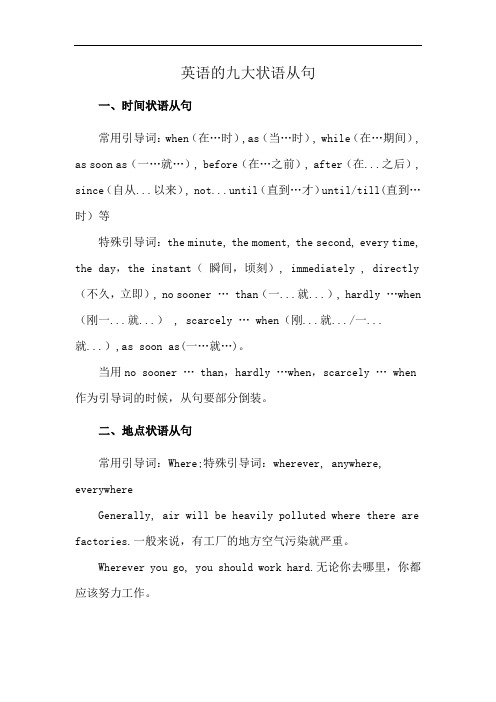
英语的九大状语从句一、时间状语从句常用引导词:when(在…时),as(当…时), while(在…期间), as soon as(一…就…), before(在…之前), after(在...之后), since(自从...以来), not...until(直到…才)until/till(直到…时)等特殊引导词:the minute, the moment, the second, every time, the day,the instant(瞬间,顷刻), immediately , directly (不久,立即), no sooner … than(一...就...), hardly …when (刚一...就...) , scarcely … when(刚...就.../一...就...),as soon as(一…就…)。
当用no sooner … than,hardly …when,scarcely … when 作为引导词的时候,从句要部分倒装。
二、地点状语从句常用引导词:Where;特殊引导词:wherever, anywhere, everywhereGenerally, air will be heavily polluted where there are factories.一般来说,有工厂的地方空气污染就严重。
Wherever you go, you should work hard.无论你去哪里,你都应该努力工作。
地点状语从句一般由连接副词where, wherever等引导,已经形成了固定的句型。
三、原因状语从句多由because, since, as 引导。
because 引导的从句一般放在句末,表示直接的原因,语气最强回答why提出的问题,重点在从句;since 引导的从句一般放在句首,表已知的原因,全句重在交代结果,比because 语气弱,常译作“既然”; as 引导的从句放在句首或句末,表示比较明显的原因,说明因果关系,语气较弱,重点在主句四、目的状语从句通常由so that, in order that, so, in case“以防、以免”等连词引导。
状语从句
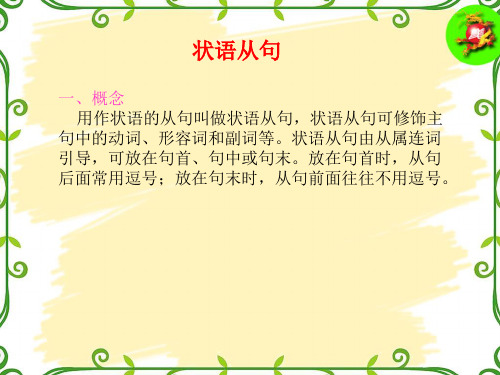
状语从句
(2)since引导的从句的语气次于because引导的从句, 常表示稍加分析后推断出来的原因,或指的是人们已 知的事实。比as正式,意为“既然;鉴于”,常置于 句首。 Since I must die, I must do it. 既然我终有一死,我一 定要这样做。 (3)as语气最弱,其原因只是对结果的附带说明,一 般放在句首。 As he wasn't ready in time, we went without him. 由 于他没有及时做好准备,我们没等他就走了。
状语从句
6.让步状语从句 (1)though, although引导让步状语从句时,句子中不 能有but,但是 though / although和yet可连用。 Though the sore be healed, yet a scar may remain. 伤口虽愈合,但伤疤留下了。(谚语) (2)as, though 引导的让步状语从句中,若以形容词、 名词或动词等开头,整个从句必须置于主句之前。 Child as / though he was, he knew what was the right thing to do. 虽然是个小孩,但他知道该做什么。 (3)even if, even though“即使”。 We'll make a trip even though the weather is bad. 即 使天气不好,我们也要去旅行。 (4)whether...or...“不管……还是……”。 Whether you believe it or not, it is true. 信不信由你, 这确实是真的。
状语从句
5. 时间状语从句 (1)when的用法 ①when 既可引导一个持续性动作,也可引导一个短 暂性动作;可用于表示主句和从句动作同时发生或从 句动作先于主句动作。 I was thin when I was a child. 我小时候很瘦。 ②when 引导时间状语从句时,如果主句和从句的主 语相同,且从句中有be动词,则从句可省略主语和be 动词。 When (you are) in trouble, you can visit this man. 当有麻烦时,你可以找这个人。
九种状语从句
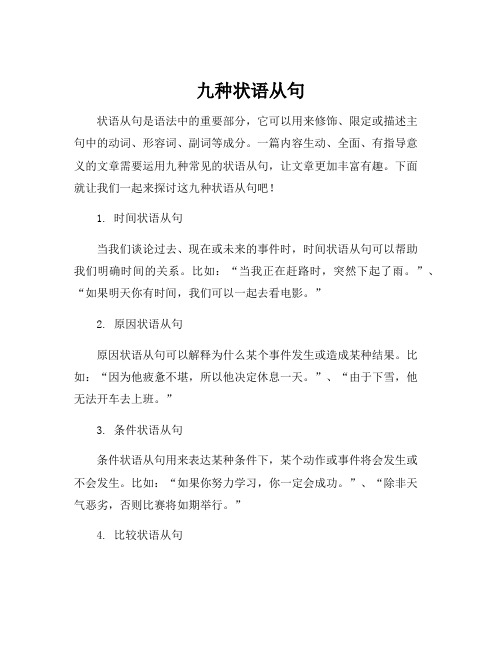
九种状语从句状语从句是语法中的重要部分,它可以用来修饰、限定或描述主句中的动词、形容词、副词等成分。
一篇内容生动、全面、有指导意义的文章需要运用九种常见的状语从句,让文章更加丰富有趣。
下面就让我们一起来探讨这九种状语从句吧!1. 时间状语从句当我们谈论过去、现在或未来的事件时,时间状语从句可以帮助我们明确时间的关系。
比如:“当我正在赶路时,突然下起了雨。
”、“如果明天你有时间,我们可以一起去看电影。
”2. 原因状语从句原因状语从句可以解释为什么某个事件发生或造成某种结果。
比如:“因为他疲惫不堪,所以他决定休息一天。
”、“由于下雪,他无法开车去上班。
”3. 条件状语从句条件状语从句用来表达某种条件下,某个动作或事件将会发生或不会发生。
比如:“如果你努力学习,你一定会成功。
”、“除非天气恶劣,否则比赛将如期举行。
”4. 比较状语从句比较状语从句用来比较两个或多个事物之间的差异或相似之处。
比如:“他弟弟比他更高。
”、“这个城市比我之前去过的任何一个城市都要美丽。
”5. 目的状语从句目的状语从句用来说明一个动作的目的或意图。
比如:“我带着伞出门,以便在下雨时不被淋湿。
”、“我希望今天能早点完成工作,以便有时间陪家人。
”6. 结果状语从句结果状语从句用来描述某个动作或事件的结果。
比如:“他在考试中取得了好成绩,因此他非常开心。
”、“他没来参加会议,结果被罚款了。
”7. 让步状语从句让步状语从句用来表示与主句相反或相对独立的情况。
比如:“尽管她很累,但她还是坚持完成了任务。
”、“虽然下雨了,但我们还是坚持去爬山。
”8. 方式状语从句方式状语从句用来描述某个动作或事件的方式或方法。
比如:“他走路时像风一样迅速。
”、“我用力地挥舞着手臂,好让朋友看到我。
”9. 地点状语从句地点状语从句用来说明一个动作或事件发生的地点。
比如:“我们约定在公园里见面。
”、“我在你旁边坐着等你。
”通过运用这九种状语从句,我们可以大大丰富文章的表达,使文章更加生动、有趣。
状语从句(9种全)
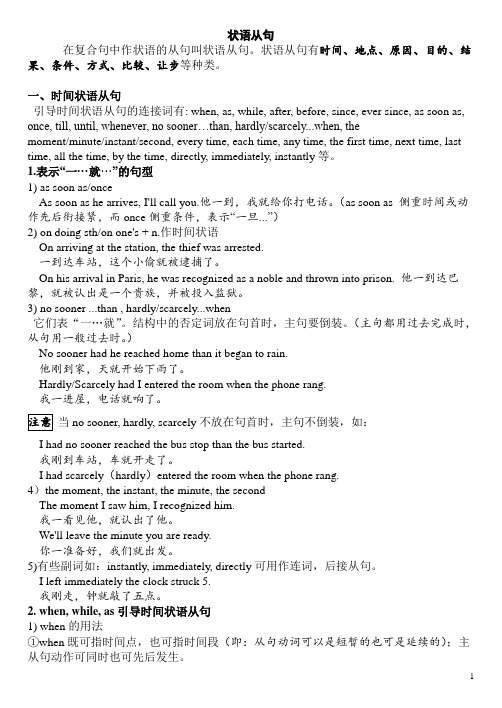
状语从句在复合句中作状语的从句叫状语从句。
状语从句有时间、地点、原因、目的、结果、条件、方式、比较、让步等种类。
一、时间状语从句引导时间状语从句的连接词有: when, as, while, after, before, since, ever since, as soon as, once, till, until, whenever, no sooner…than, hardly/scarcely...when, themoment/minute/instant/second, every time, each time, any time, the first time, next time, last time, all the time, by the time, directly, immediately, instantly等。
1.表示“一···就···”的句型1) as soon as/onceAs soon as he arrives, I'll call you.他一到,我就给你打电话。
(as soon as 侧重时间或动作先后衔接紧,而once侧重条件,表示“一旦...”)2) on doing sth/on one's + n.作时间状语On arriving at the station, the thief was arrested.一到达车站,这个小偷就被逮捕了。
On his arrival in Paris, he was recognized as a noble and thrown into prison. 他一到达巴黎,就被认出是一个贵族,并被投入监狱。
3) no sooner ...than , hardly/scarcely...when它们表“一…就”。
结构中的否定词放在句首时,主句要倒装。
9种状语从句

9种状语从句标题:了解九种常见的状语从句状语从句是语法中的一种重要结构,用于描述或修饰主句中的动作、时间、原因、条件等。
下面将介绍九种常见的状语从句。
1.时间状语从句:当我们需要描述一个动作发生的时间时,可以使用时间状语从句。
例如,“我会在你回来之前完成作业。
”2.原因状语从句:原因状语从句用于解释主句中的原因或理由。
例如,“由于下雨,他没有去上学。
”3.条件状语从句:条件状语从句描述了主句中的动作发生的前提条件。
例如,“如果你明天来,我们可以一起去看电影。
”4.方式状语从句:当我们需要描述一个动作或事件的方式时,可以使用方式状语从句。
例如,“他唱歌的方式让人感动。
”5.地点状语从句:地点状语从句用于描述主句中的动作发生的地点。
例如,“我在哪儿等你,你就来哪儿。
”6.目的状语从句:目的状语从句解释了主句中的动作的目的或意图。
例如,“我去超市买东西,是为了准备晚餐。
”7.结果状语从句:结果状语从句用于描述主句中的动作的结果或后果。
例如,“他学习努力,所以考试取得了好成绩。
”8.让步状语从句:让步状语从句用于表达与主句中的动作相反的情况。
例如,“尽管下雨了,但他还是去跑步了。
”9.比较状语从句:比较状语从句用于进行比较。
例如,“她比我更聪明。
”以上是九种常见的状语从句,每一种都有不同的用法和功能。
在写作中,熟练掌握这些状语从句的用法,可以丰富句子的表达方式,使文章更加清晰和有逻辑。
总结一下,文章介绍了九种常见的状语从句,包括时间、原因、条件、方式、地点、目的、结果、让步和比较状语从句。
正确使用这些状语从句可以使文章更加流畅和表达更加准确。
状语从句

• The phenomenon provides a way for companies to remain globally competitive while avoiding market cycles and the growing burdens imposed by the employment rules, healthcare costs and pension plans.
• On a rainy day I was driving north through Vermont when I noticed a young man holding up a sign reading “Boston”.
• 此句为when的主从句时态搭配:一般过去时与过去进行时搭配,短暂 动词用一般过去时,而延续动词用过去进行时。意义为:在一个延续 动作的背景中发生了一个短暂动作。 • 在一个雨天,我正驾着车往北穿越福蒙特州。这时我突然看见一个年 轻男子,手里举着牌子,上面写着“grees on the number of Americans who are homeless. Estimates range anywhere from 600,000 to 3 million. Although the figure may vary, analysts do agree on another matter: that the number of the homeless is increasing.
地点状语 从句 原因状语 从句
where because, as, for, since
目的状语从句
- 1、下载文档前请自行甄别文档内容的完整性,平台不提供额外的编辑、内容补充、找答案等附加服务。
- 2、"仅部分预览"的文档,不可在线预览部分如存在完整性等问题,可反馈申请退款(可完整预览的文档不适用该条件!)。
- 3、如文档侵犯您的权益,请联系客服反馈,我们会尽快为您处理(人工客服工作时间:9:00-18:30)。
状语从句60题1. --- Did you remember to give Mary the money you owed her?--- Yes, I gave it to her ______ I saw her.A. whileB. the momentC. suddenlyD. once2. Hardly had he arrived in Hong Kong ________ she rang me up.A. whenB. thanC. thatD. and3. Jasmine was holidaying with her family in a wildlife park _____ she was bitten on the leg by al lion.A. whenB. whileC. sinceD. once4. Why do you want to find a new job ________ you’ve got such a good one already?A. thatB. whereC. whichD. when5. I was about to leave my house ________ the phone rang.A. whileB. whenC. asD. after6. ___ the Internet is bringing the distance between people, it may also be breaking some homes or will cause other family problems.A. WhenB. IfC. AsD. While7. He was told that it would be at least three more months he could recover and return to work..A. whenB. beforeC. sinceD. that8. Someone called me up in the middle of the night, but they hung up _____ I could answer the phone.A. asB. sinceC. untilD. before9. The crowd started cheering ______ he rose to speak.A. asB. sinceC. tillD. where10. _______ I can see, there is only one possible way to keep away from the danger.A. As long asB. As far asC. Just asD. Even if11. _____, his idea was accepted by all the people at the meeting.A. Strange as might it soundB. As it might sound strangeC. As strange it might soundD. Strange as it might sound12. I like this jacket better than that one, but it costs almost three times______.A. as muchB. as manyC. so muchD. so many13. It was not until she got home ______ Jennifer realized she had lost her keys.A. whenB. thatC. whereD. before14. Not until all the fish died in the river ______ how serious the pollution was.A. did the villagers realizeB. the villagers realizedC. the villagers did realizeD. didn't the villagers realize15. ________ you are so weak, you’d better stay at home.A. SinceB. ForC. BecauseD. Though16. I saw Mr. Smith last Sunday. We had not seen each other ________ I left London.A. asB. beforeC. sinceD. till17. We’ll have to finish the job, ______ .A. long it take howeverB. it takes however longC. long however it takesD. however long it takes18. It shames me to say it, but I told a lie when _____ at the meeting by my boss.A. questioningB. having questionedC. questionedD. to be questioned19. The man we followed suddenly stopped and looked as if _____ whether he was going in the right direction.A. to seeB. seeingC. seenD. saw20. Though _____ money, his parents managed to send him to university.A. lackedB. lacking ofC. lackingD. lacked in21. No matter ________ hard it may be, I’ll carry it out.A. whatB. whateverC. howD. however22. The research is so designed that once _____ nothing can be done to change it.A. beginsB. having begunC. beginningD. begun23. Unless _____ to speak, you should remain silent at the conference.A. invitedB. invitingC. being invitedD. having invited24. ______ , Carolina couldn’t get the door open.A. Try as she mightB. As she might tryC. She might as tryD. Might she as try25. As far as I am concerned, education is about learning and the more you learn, ________.A. the more for life are you equippedB. the more equipped for life you areC. the more life you are equipped forD. you are equipped the more for life26. Scientists say it may be five or six years it is possible to test this medicine on human patients.A. sinceB. afterC. beforeD. when27. —Did Jack come back early last night?—Yes. It was not yet eight o’clock he arrived home.A. beforeB. whenC. thatD. until28. tomorrow, our ship will set sail for Macao.A. However the weather is likeB. However is the weather likeC. Whatever is the weather likeD. Whatever the weather is like29. When ______ different cultures, we often pay attention only to the differences without noticing the many similarities.A. comparedB. being comparedC. compa ringD. having compared30. No matter how frequently , the works of Beethoven still attract people all over the world.A. performedB. performingC. to be performedD. being performed31. After the war, a new school building was put up ________ there had once been a theatre.A. thatB. whereC. whichD. when32. ____ he took part in the competition, he won a second prize.A. For the first timeB. At a timeC. At one timeD. The first time33. I would appreciate it _______ you call back this afternoon for the doctor’s appointment.A. untilB. ifC. whenD. that34. I had just started back for the house to change my clothes _____ I heard the voices.A. asB. afterC. whileD. when35. The class went on with the story _____ they had left it before the holiday.A. whereB. whichC. in whichD. when36. --- Don’t look down upon Bob. He has his own advantages.--- Oh, yes. ________ others are weak, he is strong.A. IfB. WhenC. WhereD. Though37. The day must be breaking, _____ the birds have begun singing.A. becauseB. asC. forD. since38. John may phone tonight. I don’t want to go out ________ he phones.A. as long asB. in order toC. in caseD. so that39. The roof fell _____ he had time to dash into the room to save his baby.A. beforeB. asC. afterD. until40. --- The thread of my kite broke and it flew away.--- I had told you it would easily break ________it was the weakest.A. whenB. whereC. unlessD. since41. The two girls look ____ much alike ____ no one can tell them apart.A. so, thatB. so, andC. as, thatD. such, that42. She is willing to help you, ________ busy she is.A. whatB. howC. howeverD. whatever43. You should make it a rule to leave things ________ you can find them again.A. whenB. whereC. thenD. there44. --- Shall Brown come and play computer games?--- No, ________ he has finished his homework.A. whenB. ifC. unlessD. once45. ____ we gave him something to eat, he would save it up for his little sister.A. WhateverB. HoweverC. WheneverD. Whichever46. I had cut the meat into pieces ________ Mother started cooking.A. whenB. as soon asC. afterD. while47. --- Did Linda see the traffic accident?---No, no sooner ______ than it happened.A. had she goneB. she had goneC. has she goneD. she has gone48. everybody is here, Let’s begin our meeting.A.Now that B.Because C.For D.When49. You will succeed in the end _____ you don’t give up halfway.A. even ifB. as thoughC. as long asD. unless50. Girl _____, she is much naughtier than a boy.A. although she isB. though she isC. though is sheD. although is she51._____ I saw him I knew he had failed the experiment.A. In a momentB. For a momentC. The momentD. After a moment52. So difficult it to work out the problem that I decided to ask Tom for advice.A. I did findB. did I findC. I have foundD. have I found53. --- How is everything going on with you in Europe?---Quite well. Not so smoothly as I hoped, _________.A. thoughB. insteadC. eitherD. too54. ---Have you been to New Zealand?---No, I’d like to, _______.A. tooB. thoughC. yetD. either55. --- How long has this bookshop been in business? --- 1982.A. AfterB. InC. FromD. Since56. --- I am going to the post office.--- you’re there, can you get me some stamps?A. AsB. WhileC. BecauseD. If57. ---Dad, I’ve finished my assignment.---Good, and __________ you play or watch TV, you mustn’t disturb me.A. wheneverB. whetherC. whateverD. no matter58. We were told that we should follow the main road ___we reached the central railway station.A. wheneverB. untilC. whileD. wherever59. —What was the party like?—Wonderful. It’s years __________I enjoyed myself so much.A. afterB. beforeC. whenD. since60. ________, I could not memorize the text.A. However hard did I tryB. However hard I triedC. However I tried hardD. However I had tried hard。
